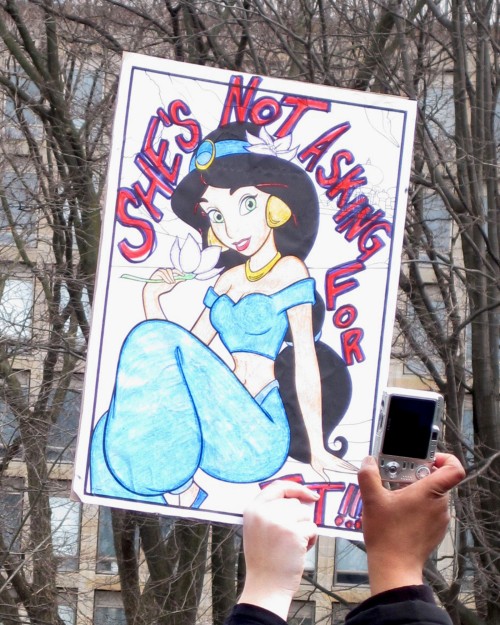This post is part of our special coverage Global Development 2011 and SlutWalks 2011.
Slut Walk, a fresh feminist movement that originated from Toronto Canada in April this year, and had been taking rounds of various western cities like, London, Melbourne, Brisbane, Montreal, Saskatoon, Edmonton, Hamilton, San Diego and Vancouver and few others, is now coming to New Delhi, the Indian capital. Scheduled for late July Delhi will be the first Asian city to hold a slut walk.
In India this has been a season of protests and campaigns with two colossal figures, spiritual leader Baba Ramdev and Gandhian Anna Hazare both going onto fasting persuading the Government of India to take actions against corruption and other such rots in the system.

Hundreds protest in Canada against a Toronto Police Officer who claimed "women should avoid dressing like sluts in order not to be victimized." Image by Natalie A., copyright Demotix (03/04/11).
The mainstream media in India plays a huge role in making or breaking these campaigns, and the Slut Walk seems to be their current favorite. Several news and views have been floated all across the mainstream media. Almost every major newspaper or magazine have carried a related story.
The bloggers community however has not been so vocal about the movement. From the random buzz one hears on the social media one would imagine Slut Walk Delhi is the most important topic that citizens are talking about. Most of the buzz is created by sharing, forwarding, retweeting and liking the content created by mainstream media.
On Youth Ki Awaz, a collaborative youth blog, Alam Bains wrote in support of the movement:
The Slut Walk is a good initiative and is addressing an important issue but what is required to make movements like these successful is sensitizing the society. Women should be respected and so should their rights to live their life the way they want.
Vidyut at Aam Janata has been writing consistently on the topic. In her first post on the topic she said she had been waiting for the movement to come to India:
We need a slutwalk to happen in every city, town, village and locality. We need a slutwalk happen each time a woman steps out on the street. It is going to be a long journey to change minds, to create that space for the dignity of being a person and expecting safety as a right. To getting people to realize that no matter how a woman dresses, she is a person, and she has a right to say “no”.
In her following post Vidyut addressed the criticism against the naming of the movement, why call it ‘slut’ walk? “It is not just the word slut. It is an attitude.” She says and hopes that this movement will shame the attitude not the word.
Chandni at Bohemian Rhapsody wrote that the reason some people are reacting negatively to the name of the movement is because they are thinking from a patriarchal mindset which believes women are devoid of sexuality.
And yet, one of the first reactions is discomfort with the word slut. Why use that word for the protest?
Why not, I ask you? Can’t you look past it? The women first – Is it embarrassing? Uncomfortable? Derogatory? Would you be more comfortable holding your head high and walking in this protest if it were called “Nari mukti morcha” or “women against rape” or something? Say the word. Slut. Think about it. Why does it make you squirm?
And the men – Is it amusing? Inviting? Does it bring forth visions of promiscuous women dying to get laid, lining up for your viewing pleasure? The ultimate fantasy, eh?
Womens’ sexuality anyone? Oh, that doesn’t exist.
That is exactly why it is a good thing. Reclaiming the word. Repeating again and again “STOP BLAMING THE VICTIM AND HER CLOTHES”. It is as simple and as basic as that.

At least 200 people participated in the Slut Walk Brazil, inspired by a protest in Canada in April, by women struggling against violence and the right to wear the kind of clothes they like. Sao Paulo, Brazil. Image by Andre M. Chang, copyright Demotix (04/06/11).
In spite of being an instant hit amongst the young urban youth hundreds and thousands of who have shown their support by joining the event’s Facebook page or by tweeting or putting up status messages, the movement have been continuously facing criticism due to its name.
I have written in my personal blog that the problem with the word slut is not because of the shame attached to it, but because of its lack of significance in the Indian context.
‘Slut’ – the word entered Indian people’s vocabulary through international movies and TV series as part of the cultural change that took place post the cable TV.
To begin with the word is not in common use. [..] I believe ‘slut’ as an abuse is a recent entry and is mostly in use amongst the upper class English speaking urban youth.
We never used the word ‘slut’ in the same way, so what are we reclaiming? Who are we reclaiming it from? Why do we have to reclaim it when most people in Delhi do not even know what it means? And if the point of the event is only to say that we never asked for it, then you don’t have to call it Slut Walk just because that phrase sparked interests in other countries.
I also think that this idea of importing a western movement without first putting it in the local context is very Eurocentric.
Christine Pemberton an expatriate of Indian origin living in New Delhi, speaks from her 70’s feminist heart:
I hope to God I am wrong, but I have visions of men taking photographs of these girls, ogling them, trying to touch them – and not getting the point at all.
To be blunt, I don’t think Delhi is ready for this kind of in-your-face protest. Sad, but true.
Kuber Sharma wrote in MustBol, a youth led community blog, that there is no need to label oneself as slut to make protest. Kuber also mentioned that the word is not in use in India so the people on the street wouldn’t know what this protest is all about.
Reena has compiled an informative list of tweets on the topic.

Slut Walk came to London as thousands of women marched demanding the right to wear what they choose. UK. Image by Upstream And Me, copyright Demotix (11/06/11).
Journalist Seema Goswami wrote on her blog that this idea of allowing women whatever and however little they want to wear and not be prepared for the consequences is nothing but double standard. And that we wouldn’t be so comfortable in allowing men to sexualize their surrounding the same way some women want to.
So, let’s take a step back and allow men to put their own flesh on display if they feel so inclined. They can whip off their shirts at the office; show the crack of their bums on the streets; and go dancing in nightclubs sporting just their underwear. Yes, I agree, it won’t be long before the women start crying foul.
You turned yourself into an easier target because of your actions – and you have to take the rap for that. Every choice we make has consequences; and we have to keep those consequences in mind every time we make a choice.
Seema Goswami’s criticism like many others is based on the premise that the very nature of the campaign is objectionable. Whereas my criticism is rather with the name of the event.
Last week the event organizers attempted to contextualize the movement by renaming it as Slut Walk Delhi arthaat Besharmi Morcha. But the desi version of the movement has fewer takers. When a question was posted on the event’s facebook page asking people what they thought of the new name, the responses were self revealing: (I have posted in my blog some of the screen shots of these Facebook responses)
“Besharmi Morcha is for ‘illiterate’ people who don’t know the meaning of slut. Slut walk is appropriate and sophisticated”
“Not at all. It is absolutely inappropriate…Don’t degrade the level of the parade”
“This punch line is not appropriate this will actually lower down the standards…”
“Slut walk is so ‘cool,’ besharmi whatever sounds gay!”
They (young campaign supporters) don’t have a proper understanding of either feminism or violence against woman or activism. They don’t know the ground realities; they don’t care about making a real change. They just jumped the wagon because Slut Walk sounded like the next cool import from the west after MTV.
That said, however the new name does seem like hitting where it hurts. A Hindi name make it rude, rustic and more importantly real. A real name was required for such an in your face campaign.
On the new name Vidyut wrote,
Not many Indians understand “Slut”, but being called besharam (shameless) is a fact of life for many of us. I’m extra thrilled because the name now includes in its meaning the lack of shame in being a woman. And that being a good thing – as in – nothing to be ashamed of.
It remains to be seen how many girls and women actually come forward to this scheduled Slut Walk or Besharmi Morcha. The event was originally announced for 25th June but have now been postponed to July end for better planning. The event is likely to create a age divide and class divide amongst the feminist movement, if at all it can be seen as a step in the feminist movement. So far the traditional feminist organizations have kept quiet over the topic and no organization have been directly involved with the event.
This post is part of our special coverage Global Development 2011 and SlutWalks 2011.







18 comments